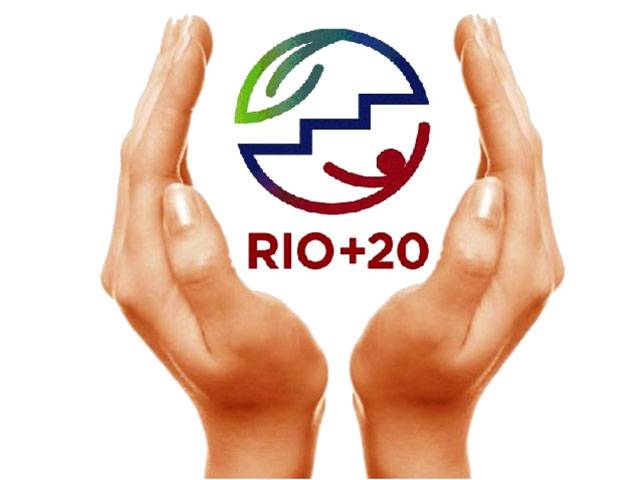Alfredo Leoni
Between June 13 and June 22, 2012, Brazil will host the United Nations Conference on Sustainable Development, known as Rio+20. This will be the largest international Conference in history, gathering more than 50,000 participants and over 120 heads of state and heads of government. The Pakistani delegation is an important part of the Conference, as there are more than 70 delegates confirmed, headed by Prime Minister Yousuf Raza Gilani.
Rio+20 will be an opportunity to hold discussions on a different development model at the highest level. In this sense, Rio+20 will be very different of the Rio 92 Conference, its predecessor, since the current meeting is much more than an environment Summit.
Rio 92 was the last step of a long negotiation process, of many important documents and conventions on environment, such as the Convention on Climate Change and the Convention on Biodiversity. In turn, Rio+20 looks to the future, building a new sustainable development agenda. To the extent that Rio 92 was a point of destination, Rio+20 may be considered a point of departure.
Rio+20 is not only an environmental conference, it will be a conference on sustainable development, a concept that was formulated during the 1980’s and that encompasses three dimensions: the economic, the environmental, and the social. It is much broader than dealing with environment alone, since it is impossible, in times of economic and social crisis, to overlook the importance of those two essential dimensions. During the Rio+20, not only ecology will be discussed, but also how to fight extreme poverty and hunger, and how to develop countries’ economy without harming the environment.
The discussions on the Conference will be held around two major subjects, one of which is green economy in the context of sustainable development and poverty eradication. Brazil, along with the majority of countries, believes that a single model on how to deal with those issues should not be the output of the Conference. Each country will have the freedom to create its own model on green economy, which should be based on its national realities, the resources available and the development challenges that the country faces. Moreover, it is impossible to think on a green economy without taking into account social inclusion goals.
For me, it is a great honour to be the Ambassador of a country that is taking so seriously the quest for sustainable development. Brazil has been taking important actions for the last decade in order to grow and develop without disregarding the environment, and most importantly, its people. My country is not only hosting and organising this impressive meeting, which will be able to set new agendas and new concepts that will be of paramount importance for humankind, but also setting many examples.
Environmentally, Brazil has already reached many goals. We have the biggest forest in the world, the Amazon Forest, the habitat of hundreds of thousands of species, that we have been able to safeguard, even while economically growing at fast rates. Over the last three years our GDP has grown over 12%, and yet, we have registered the lowest rates of deforestation in history. We are the sixth biggest economy of the world, member of all major economic fora, member of the BRICS, and yet, we still have 4.6 million square kilometres of untouched forests. Brazil will not take the same path of the biggest economies of the past, which have destructed their entire environment in order to grow. We are setting new models and new ways on how to deal with our growth.
Most importantly, Brazil is being able to share the benefits of its economic growth with its population. We have developed a very efficient programme for social inclusion, by the transference of income and by guaranteeing that every Brazilian has at least three meals a day. Through our sophisticated social programmes, the Brazilian Government managed to lift 30 million people out of the poverty line, and an impressive amount of Brazilians can enjoy now a much better quality of life.
The second subject of Rio+20 is governance for sustainable development. In other words, it is necessary to adapt the framework of the UN system, so as to strengthen multilateralism, reduce the democratic deficit and provide greater integration among the social, economic and environmental aspects of sustainable development.
Brazil was a pioneer when launched social programmes such as “Bolsa Familia” and “Zero Hunger”. Those programmes are an inspiration to many countries, including Pakistan, which is willing to establish its own version of the “Zero Hunger” Program.
I am sure we will also be pioneers when it comes to sustainable development and to a new model of social inclusion. I am sure that Pakistan will always be a partner and a supporter of every policy related to improving people’s quality of life whilst protecting the nature, as Pakistan, since the Rio 92 Conference, has been an active player on environmental issues, and is taking a huge delegation of more than 70 people, including politicians, scholars, journalists and researchers.
With the help of Pakistan, I am sure we will be able to reach one of our President Dilma Rousseff’s wishes for this conference: after Rio+20, we want the word “development” to always be associated to the adjective “sustainable”.
Alfredo Leoni is an Ambassador of Brazil in Pakistan.
Thursday, April 18, 2024
From Rio 92 to Rio+20: Setting new agendas

ITP cracks down on traffic violations
April 18, 2024
Illegal housing societies in Rawalpindi to face crackdown
April 18, 2024
SZABIST traffic volunteers visit Safe City Islamabad
April 18, 2024
Hepatitis Challenge
April 18, 2024
IMF Predictions
April 18, 2024
Wheat War
April 18, 2024
Rail Revival
April 17, 2024
Addressing Climate Change
April 17, 2024
Justice denied
April 18, 2024
AI dilemmas unveiled
April 18, 2024
Tax tangle
April 18, 2024
Workforce inequality
April 17, 2024
New partnerships
April 17, 2024
ePaper - Nawaiwaqt
Advertisement
Nawaiwaqt Group | Copyright © 2024





